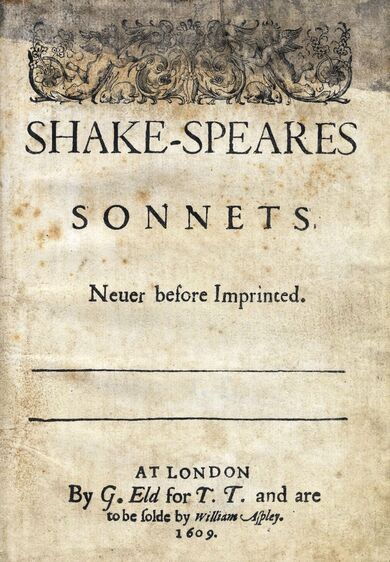Sonnet CXXXVIII: When my love swears that she is made of truth
I do believe her, though I know she lies,
That she might think me some untutor'd youth,
Unlearned in the world's false subtleties.
Thus vainly thinking that she thinks me young,
Although she knows my days are past the best,
Simply I credit her false speaking tongue:
On both sides thus is simple truth suppress'd.
But wherefore says she not she is unjust?
And wherefore say not I that I am old?
O, love's best habit is in seeming trust,
And age in love loves not to have years told:
Therefore I lie with her and she with me,
And in our faults by lies we flatter'd be.
lies (2): meaning both "tells lies" and "lies (has sex) with other men."
That (3): So that.
vainly (5): wrongly.
Simply (7): i.e., Like a simpleton.
credit (7): believe.
wherefore (9): why.
unjust (9): dishonest (about her fidelity).
habit (11): guise.
age in love (12): older lovers.
Therefore I lie...me (13): Notice again the double meaning of lie. The line can also be interpreted as "That is why I sleep with her and she with me."
In Sonnet 138 the poet candidly reveals both the nature of his relationship with the dark lady and the insecurities he has about growing older. Unlike his intense yet healthy love affair with the young man, the poet's fling with his mistress is (for now) uncomplicated and practical, fulfilling his most basic needs of both sexual pleasure and continual reassurance that he is still worthy of love despite his age. So emotionally detached is the poet from his mistress that he prefers simply to ignore her lying and adultery. The poet's glib indifference toward his mistress is startling, particularly when juxtaposed with his profound concern for the young man, who cannot even be the subject of a rival poet's work without rendering him "tongue-tied" and "faint" (Sonnet 80).
The Sonnets as a whole show us that time is the poet's great nemesis and, although the dominant theme in Sonnet 138 is the comfort that lies bring to an insecure mind, a discourse on the ravages of time is once again present. A variation of Sonnet 138 was originally included in The Passionate Pilgrim (1599), along with Sonnet 144. There are minor differences between the two poems and for those who wish to do a comparison of the two I reprint it here:
q\WHEN my love swears that she is made of truth,I do believe her, though I know she lies,
That she might think me some untutor'd youth,
Unskilful in the world's false forgeries.
Thus vainly thinking that she thinks me young,
Although I know my years be past the best,
I smiling credit her false-speaking tongue,
Outfacing faults in love with love's ill rest.
But wherefore says my love that she is young?
And wherefore say not I that I am old?
O, love's best habit is a soothing tongue,
And age, in love, loves not to have years told.
Therefore I'll lie with love, and love with me,
Since that our faults in love thus smother'd be.





